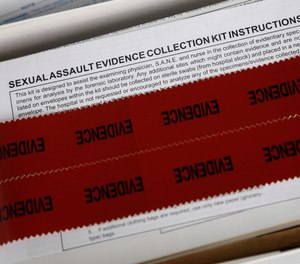
The Fulton County DA received the grant to hire two detectives from Atlanta PD to assist with mitigating the backlog of cases, some dating back to the 80s
By Jozsef Papp
The Atlanta Journal-Constitution
ATLANTA — A new grant received by the Fulton County District Attorney’s Office will allow investigators to examine and test the majority of more than 4,000 sexual assault kits stuck in a years-long backlog.
“This work can be made possible because the government has given us $2.5 million,” Fulton County DA Fani Willis said in a press conference. “That is a wrong we’re correcting.”
Willis said the federal grant will allow the DA’s office to hire and pay for two detectives from the Atlanta Police Department to assist with mitigating the backlog of cases, with some of the sexual assault kits dating back to the 80s and 90s. Willis said the estimated backlog is about 4,340 unexamined kits, with 3,588 of those kits from the Atlanta jurisdiction.
“Each of those 4,342 kits represents a victim,” Willis said. “Every victim we are able to help with this grant and this partnership is a victim that’s really waited too long for justice.”
During a press conference Thursday, Willis recounted the story of her team recently interviewing a victim whose case was decades old. Willis said the victim told her team that nobody had called her in 37 years about her case. Willis said the victim felt relief that her case was being looked at.
But the benefits go beyond bringing justice to rape victims. As her team continues to test the kits, serial rapists are discovered, Willis said.
“If those rape kits had been looked at all those years ago, we could’ve avoided sexual assaults and we could’ve avoided all these other crimes,” she said.
One of those cases occurred back in 2000 at Spelman College, when a woman attending the school was kidnapped and raped. Willis said her office tried the case involving the woman who came to Atlanta to “live out her dream” and go to Spelman. Through testing of the kits, convicted serial rapist Cleophus Ward was linked to the 2000 case and sentenced to life in prison plus 20 years.
Willis said Ward went on and assaulted four other people. In 2004, Ward was convicted of raping three woman but was released from prison in 2017, after he was allowed to serve the rest of his sentence on probation.
Deputy Fulton County District Attorney Julianna Petterson, who oversees the Fulton County Sexual Assault Kit Initiative (S.A.K.I. Unit), said her team had already started testing the first 300 kits and have been able to find matches for many and even connect a suspect to multiple cases. Patterson said a large portion of the kits have sperm, so they expect to get a “substantial number of DNA profiles.”
The backlog of kits was first discovered at Grady Memorial Hospital back in 2015 and 2016. A 2015 Atlanta Journal-Constitution investigation found more than 1,400 kits went untested at Grady, even though victims wanted them transferred to law enforcement. Police failed to pick them up, and the hospital kept them on the mistaken belief that federal regulations barred their release.
In 2016, the Georgia Legislature passed a law requiring all Georgia law enforcement agencies to send stored rape kits to the GBI headquarters in Decatur for testing . In 2021, a law was passed that allowed victims of sexual assaults to keep track of evidence in their cases from collection to prosecution.
Willis said one of the issues is that the GBI doesn’t have enough scientists to perform all the tests. As a result, much of the work is then outsourced.
In a statement, the GBI said it was in full support of the initiative between the Fulton DA and APD to test the older kits.
“The kits were previously evaluated and tested by the GBI Crime Lab to the extent possible at the time of their submission before the year 1999. The evidence is currently being held at the crime lab as part of our support for their initiative to utilize current technology to develop investigative leads in older, unsolved cases,” the statement reads.
Willis called it a “historical tragedy” that so many victims have waited to get justice. She said the problem of the backlog is not limited to Georgia.
“Some of these perpetrators live among us and have not stopped their lives of crime,” Willis said.
Willis said she wished she had more money to test all the kits in the backlog but warned it will take time to do so. Willis said in some cases, the suspect or the victim is already dead.
“It’s gonna take a long time. We may never get through all of them, but what’s exciting is we are whittling them down,” Willis said.
—
©2023 The Atlanta Journal-Constitution.
Visit at
ajc.com
.
Distributed by
Tribune Content Agency, LLC.
McClatchy-Tribune News Service
Copyright © 2025 PoliceGrantsHelp.com. All rights reserved.
